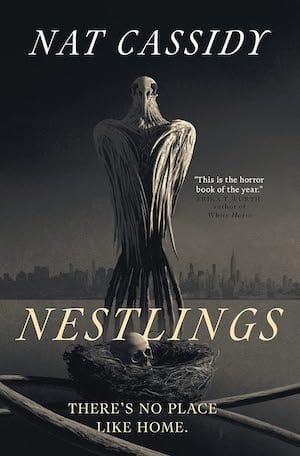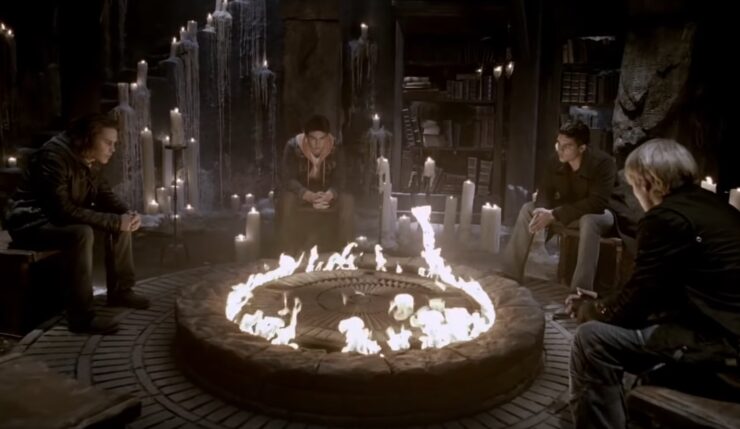Picture an illuminated grimoire page detailing the spell “to captivate queers” and you basically have all the ingredients that add up to the 2006 supernatural horror flick, The Covenant, now on Hulu. Start with a high school coven of male witches, who happen to all be impossibly hot (all played by actors in their twenties, in the long Hollywood tradition). Add a pact of secrecy. Bro-y hijinks. Maybe some homoeroticism shrouded in competitiveness. Don’t forget a gratuitous swim team practice scene. Toss it in a cauldron, and, abracadabra.
With all the magic bursting off the screen over the course of 97 minutes—telekinetic fights! exploding cars! angry ghosts!—the film’s most powerful spell is its grasp on queer imaginations. Even if it’s been basically scrubbed from the memories of the mainstream canon of magical franchises.
The film stars four young men, called the Sons of Ipswich, who run the show at a modern-day elite Massachusetts boarding school called Spenser Academy. The Sons—Caleb (Steven Strait, well before his run on the excellent sci-fi show The Expanse), Pogue (Taylor Kitsch), Reid (Toby Hemingway), and Tyler (Chace Crawford)—are the latest in a long line of male witches, bound by a pact of secrecy that traces back to the witch trials in colonial America. From telekinesis, to enhanced strength, to conjuring dead spirits, their broad gifts are known only as “the Power.” But their gifts come at a price: Magic is not only addictive, it also drains their vitality. When a newcomer named Chase (played by Sebastian Stan, in a role that must’ve helped him land the character of troubled Bucky Barnes in the Avengers films) rolls into school, a series of disturbing magical events has Caleb wondering if one of the Sons is misusing his gifts. Or if Chase may be a member of the banished magical fifth family. Which, pretty quickly into the trailer, is spelled out for you with big, blinking letters.
Buy the Book


Nestlings
It certainly didn’t hurt that when the trailer first dropped, it offered an enchanting promise. Here must be the male-centered answer to the ass-kicking magical women that were picking up pop-culture steam (and captivating queer fans) throughout much of the nineties and early 2000s. Buffy, Willow and company on Buffy the Vampire Slayer. The powerful witch sisters of Charmed. And just maybe The Covenant could ascend to the heights of the 1996 cult (and occult) movie masterpiece, The Craft? We hoped.
Faster than you could call the corners, the marketing Powers That Be rained down a gay-baiting marketing plan that centered on not only objectifying the male stars with a skin-heavy trailer, but also hinted that the main villain was gay. Call it queer horniness or a thirst for representation—or, more likely, both—but I absolutely bought tickets to the movie. And snatched up a DVD from Blockbuster when it came out.
During a recent re-watch, I posted a story on Instagram of the absolutely gratuitous (also, absolutely silly, fun, and sexy) swim practice scene… which summoned quips from gay friends. That movie was so fun. Or such trash but I loved it. And inevitably, omg, I remember that scene. So, clearly, I’m only one member in a big, queer coven that counts this movie among its sacred texts.
With a compelling concept, decent special effects, and a charismatic main cast, The Covenant gets a lot right, from the adrenaline-rush car chases, to flashy fight scenes with their cheesy lines that are requisite in summer action flicks. The film is just fun, especially with the near constant magic usage that bucks the “don’t use your powers for personal gain” trope. That, too, offers a surprising touch of realism in a fantasy flick. Like, what seventeen year-old young man wouldn’t flaunt magic in the face of authority? A few jump scares and spider-fueled gross-outs add fangs to the PG-13 rating. And the shadowed boarding school hallways, abandoned buildings, and old manors that hint at the gilded history of a once-grand family infuses the whole thing with an effectively creepy vibe.
The story, penned by J.S. Cardone, weaves a coming-of-age tale, with Caleb taking center stage as the most developed character and the anchor of the squad. We learn early on that instead of staying at the Spenser Academy boarding school, he lives at home to take care of his mother, who’s a kind of Grey Gardens-chic alcoholic recluse. While the other guys (knuckleheads at best, sometimes tip-toeing into “hauntings of outdated masculinity” territory at worst) occasionally abuse their powers to be complete objectifying assholes—cheating at pool, blowing up a woman’s skirt after betting on what kind of underwear she’s wearing—Caleb is a constantly reminding them about the hidden dangers of their gifts. His brooding is balanced by bits of brightness summoned by his love interest, Sarah (Laura Ramsey), and he’s upstanding without coming off as completely righteous.
And while the “magic as a metaphor for drug usage” isn’t exactly new—season six of Buffy tackled this deftly about five years prior to The Covenant—the script does take the concept in unexpected directions. The idea that habitual magic usage actually drains the life and prematurely ages magic users sees its natural conclusion through Caleb’s father, William. Early in the film the audience learns that William is dead, only to find out later that he’s still alive and in hiding, as his magic misuse has warped him into a wizened shell of himself. But even the main female characters don’t get as much of a backstory as this one minor male character. Unsurprisingly for a film centered on men, the women are about as magical as a hack pulling a rabbit out of a hat.
Sarah, the female lead, is the barest sketch of a character. We learn she transferred to the prestigious academy from a public school in Boston with her sights set on getting into Harvard. But despite Ramsey breathing warmth into her scenes, the character only really exists to fall in love with Caleb. Pogue’s girlfriend, Kate (played by Jessica Lucas) gets the short end of the magic wand, too. Despite a spark and mischievous streak, the character is little more than a source of exposition and a driving force behind one of the more annoying subplots, when Pogue gets jealous of her burgeoning friendship with Chase.
And besides the magical misfires with the women, there’s Chase.

Sebastian Stan infuses the character with the right amount of smarm and a streak of self-annihilation that belies his thirst for more power that he knows will eventually kill him. But Chase spends so much time hitting Caleb with loaded stares, that a queer spider-sense starts tingling. Because maybe he’s not thirsting just for Caleb’s power. And, hello, what about that steamy maybe gay content that the trailer promised us?!
Chase, we learn, manifested his powers like the other boys, but he had no one to guide him. He was alone and different—and if that’s not a closet metaphor, nothing is. From his fascination with Caleb, to his unhinged laughter, and his venomous one-liners and barbs about the dick sizes of other guys in the gym locker room, he’s one more entry in the cinematic bestiary of gay-coded villains. All that gay bait-y edging that started in the locker room builds to a climax during a battle between Chase and Caleb in a dorm room, when Chase finally reveals his machinations about wanting Caleb’s powers. With Caleb prone on the floor, Chase straddles him, grips him by the face and taunts him, calling him a golden boy. Before angrily kissing him on the lips, calling him “brother”—like, no homo!—and storming off.
And that’s all we got. With all the squandered potential of that scene and other aspects of the movie, what it means right now is that right now The Covenant is screaming for a reboot.
Studios are conjuring relaunches of beloved magic-fueled franchises left and right, like the recently announced Harry Potter and Twilight TV shows. Those two in particular beg the question of why in the hell audiences need second adaptations of these properties when there are a million diverse stories begging for their first. But that’s a whole ‘nother can of eye of newt. So, are you listening, streaming gods? Give us a new film starring the Sons of Ipswich. Or better yet, a TV series that adds depth and darkness to a concept that has “new franchise” written all over it. Just do us a favor. Give us what we really want—what the whole concept of The Covenant hints at—and make it real queer.
On paper, a story about magical young men grappling with their alluring powers at an elite boarding school is gayer than a Hocus Pocus-themed drag show. In fact, it’s the 2006 film’s stubborn devotion to hetero-ness, bound by boy-saves-girl chains, that prevents it from ascending to a higher level. So first up: Grab that ceremonial dagger and slice out that clunky romance between Caleb and Sarah.
New girl instantly charmed by the school golden boy, and used as a weapon against him is so played out. What’s not? Mysterious new boy Chase comes to town and the sparks fly when he and Caleb seem to have an instant, weird connection. Is it that Chase is a lost Son, or something more? Or, two Sons are secretly in love and have to hide their relationship. Not out of coming-out angst (please no coming-out agnst ever again). But because they want to save themselves all the obnoxious pressure from their parents about eventually having to father kids with a woman, just to carry on the family’s genetic legacy.
Focusing on the relationships (platonic and otherwise) between the Sons rather than the romance between Caleb and an outsider is just more interesting, too. It’s a chance to explore the dynamics between young men when they’re shoved together—perhaps unwillingly—by duty and secrecy. How do those dynamics push and pull at the different personalities, and what happens when jealousy for greater power, and maybe a little lust gets tossed in the cauldron? Plus, a longer runtime would give us a chance to dive into the history and origins of the Power, and really explore the themes of magical addiction and the burden of family legacies that were only glimpsed at in the film.
And let’s not just hear it for the boys. A queer reboot is a chance to do a better job with the women in the story, too. Give us a lesbian Spenser Academy provost completely over the entitled bullshit of the Sons of Ipswich and their families (and, hey, call that a bonus commentary on legacy admissions to elite schools). Give us an older sister to one of the Sons, who spins her resentment at a lack of access to the Power into an icy, over-achieving perfection. Sarah as a fast best friend to one of the gay Sons, who drags him into Boston as a reminder that there’s more to life than the suffocating academy and his shadowy family legacy. Give us a Kate who’s in on the secret covenant, and tries to knock some sense into dense but sweet Chase to stop with the magical dick-waving competition with the others. And Caleb’s mother who balances a fierce protectiveness for her capital-S Son with an ache for her normal son to live an almost normal life. All of this is a just premonition of what we deserve.
Leave in that swim team scene, though. It’s magic.
Nathan Tavares is a writer and editor from Boston. His debut novel A Fractured Infinity came out in December 2022, and his second novel Welcome to Forever comes out on March 5, 2023 from Titan Books.










